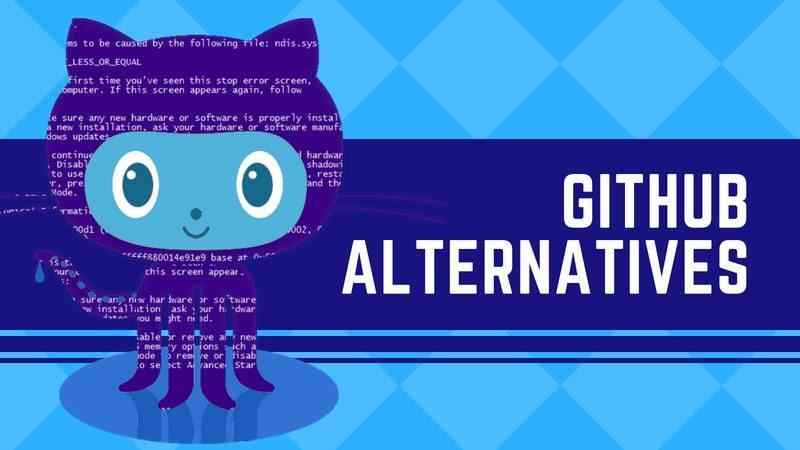Top 10 Best GitHub Alternatives

As technology evolves, there’s a growing need for alternative code hosting and collaboration solutions. Search some of the best open-source GitHub alternatives for code repositories.
GitHub stands out as the leading platform for collaborative development and code sharing. It offers a variety of advantages for developers, including efficient code management, reliable hosting, and effective project organization.
The history of GitHub has changed a bit since Microsoft acquired it in June 2018. Some developers, especially those who develop open-source software, have moved away from GitHub.
Best GitHub Alternatives (Open Source)
One of the fairly large developer teams that have moved away from GitHub is the GIMP developer team. Some open-source developers still say “no” to Microsoft, although the software company has become much more friendly to the open-source community lately.
Now is the perfect moment to explore other platforms that provide comparable features along with additional benefits tailored to your unique requirements.
1. GitLab
After Microsoft announced its acquisition of GitHub, many developers began migrating to GitLab. GitLab is considered one of the top alternatives to GitHub, especially for handling large files, and it provides similar features.
The key distinction between GitHub and GitLab is that GitLab has a community edition available as open-source software. This edition allows users to create a self-hosted software development tool, much like what the GIMP developer has done.
GitLab supports Concurrent DevOps, which accelerates the software development lifecycle. At its core, GitLab functions as a Git repository manager, but it also includes features like wikis, editing tracking, code reviews, CI/CD, and more.
2. Gitea
Gitea is an open-source software development tool developed in Go. It is lightweight and can be used on any platform, including Linux, Windows, and macOS. It has minimal system requirements and can even run on a low-cost Raspberry Pi.
Gitea utilizes Git as its version control system and offers features such as a bug tracker, code review, and a wiki. As a community-driven project, it is a fork of Gogs, another software development management tool, and is licensed under the MIT license.
3. GitBucket
GitBucket is a lightweight alternative to GitHub that you can use to manage your software development cycle. It is written in Scala and runs on the Java Virtual Machine (JVM).
The interface of GitBucket closely resembles that of GitHub. Like GitHub, GitBucket utilizes Git as its version control system. This tool offers features such as a repository viewer, a wiki, and bug tracking.
4. Gogs
Gogs is a lightweight option for those looking to set up a self-hosted software development tool. It serves as the foundation for Gitea and is also written in Go. Similar to Gitea, Gogs is designed to be resource-efficient, making it suitable for use on budget-friendly devices like a Raspberry Pi.
As mentioned on its official website, some users even run Gogs on their NAS devices. The tool utilizes Git for version control and offers additional features such as code review, a wiki, and bug tracking. Gogs is licensed under the MIT license.
5. Kallithea
Kallithea stands out from the first four tools by supporting both Git and Mercurial. It can be operated as a standalone application hosted on your server. The tool is designed to offer a tailored, self-managed interface for managing Mercurial and Git repositories.
You can install Kallithea on both Linux and Windows systems. The software is developed in Python and is available under the GPLv3 license.
Kallithea also supports LDAP, simplifying the process of using your current authentication system. Additionally, you can connect your instance to any incident tracker of your choice through the JSON-RPC API and the extension’s interface.
6. Tuleap
Tuleap is another option you can consider as an alternative to GitHub. It utilizes Git as its version control system and serves as an integrated software development tool.
Tuleap features a project management tool that centralizes all project activities, providing a single solution for planning, monitoring, developing, delivering, and maintaining applications.
Additionally, it includes an issue tracker that helps you keep track of various issues like requirements, stories, tasks, bugs, and queries.
7. Phabricator
Another open-source software option to consider as an alternative to GitHub is Phabricator. This tool utilizes Git as its version control system and also provides support for Mercurial and Subversion (SVN).
Phabricator can be installed on Linux and BSD macOS systems. As of now, it is not possible to set up the Phabricator server on Windows.
Like many other tools similar to GitHub, Phabricator includes features such as code review, bug tracking, project management, and repository hosting. It is licensed under Apache 2.0.
8. FogBugz Dev Hub
FogBugz Dev Hub serves as an alternative to GitHub, particularly for software developers looking to manage business projects. It shares similarities with Beanstalk.
Key features of FogBugz Dev Hub include See Code Changes, which helps you keep track of project updates, Projects & Rest for organizing breaks, and Search Your Code to simplify the process of locating changes, files, and code.
Additionally, FogBugz provides optional extensions to enhance its functionality, such as Time Tracking and a Wiki.
9. GitKraken
GitKraken is a well-known Git client and collaboration platform that works on Windows, macOS, and Linux. It boasts a clean, intuitive, and user-friendly interface that helps developers easily visualize complex data and code.
The platform provides a variety of features and robust Git tools designed to improve the development process and facilitate team collaboration.
10. Code Giant
Codegiant is a comprehensive DevSecOps platform that includes features for team collaboration and project management. It offers a wide range of tools to manage code, monitor issues, and automate processes, all aimed at enhancing the development workflow.
Final Words
If you need a similar tool to manage the source code of the project you and your team are currently working on, these mentioned above are the GitHub alternatives that are reliable to consider.
Also Read: Best WeTransfer Alternatives

